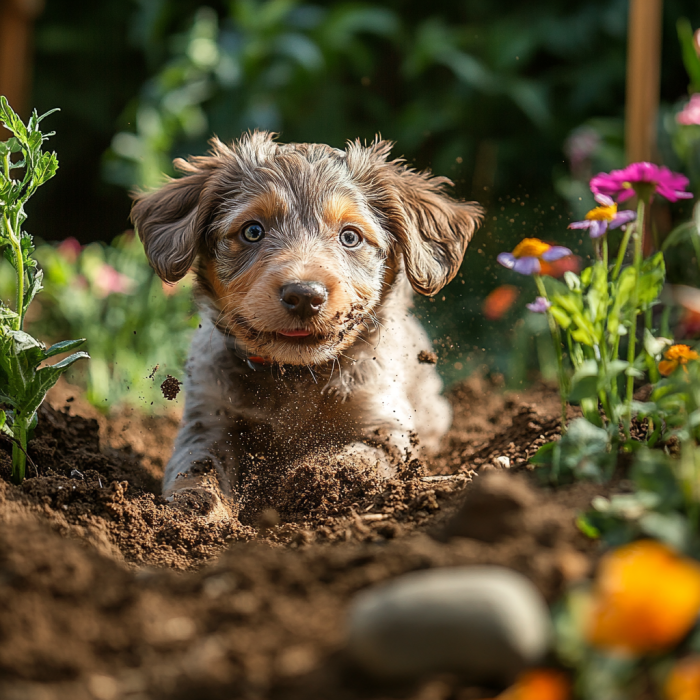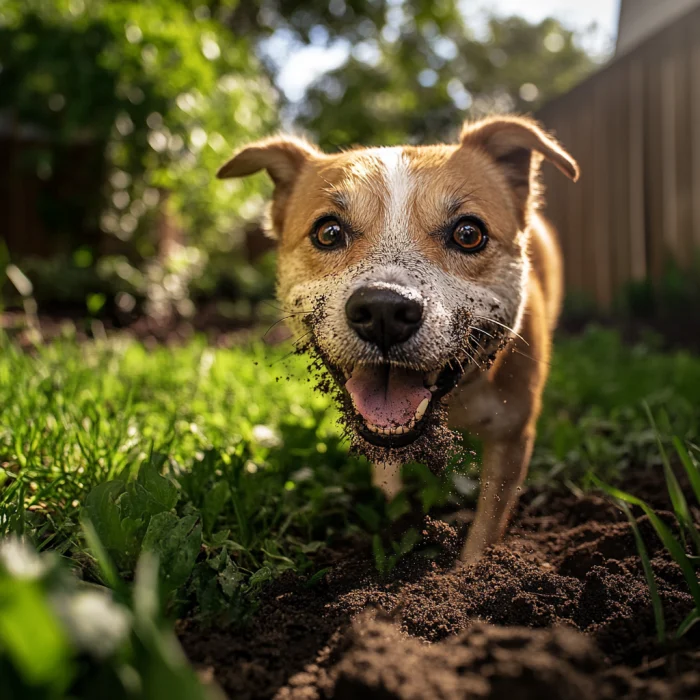Many dog owners wonder, “Why do dogs eat dirt?” This behavior can have various explanations, from nutritional deficiencies to boredom. Discover the possible causes and solutions in this comprehensive guide on why dogs eat dirt.
Why Do Dogs Eat Dirt?

Introduction
If you’ve ever caught your dog munching on dirt, you’ve probably asked yourself: Why do dogs eat dirt? This strange behavior can be puzzling and concerning for pet owners. While it may seem unusual, it’s not uncommon for dogs to eat things that they shouldn’t, including dirt. Understanding why dogs eat dirt requires exploring several possible reasons behind this behavior.
In this blog post, we’ll dive deep into the potential causes of why dogs eat dirt, how you can manage this behavior, and when you should seek professional help. By the end of this article, you’ll have a better understanding of what’s behind your dog’s desire to dig in the dirt and what you can do about it.
Table of Contents
- Why Do Dogs Eat Dirt?
- Nutritional Deficiencies and Dirt Eating
- Dogs Eating Dirt Due to Boredom
- Medical Causes of Dirt Eating
- Behavioral Issues Linked to Dirt Eating
- How to Prevent Your Dog from Eating Dirt
- When to Seek Professional Help
- Conclusion
- For More Pets Related Articles Click Here
Why Do Dogs Eat Dirt?
Many dog owners are often puzzled by their pet’s strange behavior of eating dirt. While it can be alarming, dirt eating (also known as pica) is not entirely uncommon. Understanding why dogs eat dirt requires exploring a variety of reasons, ranging from instinctual behaviors to health-related issues.
Nutritional Deficiencies and Dirt Eating
One of the most common reasons why dogs eat dirt is due to nutritional deficiencies. Dogs may consume dirt in an attempt to compensate for a lack of certain nutrients. For example, a dog may eat dirt if they are not getting enough minerals like iron, calcium, or fiber in their diet. This behavior is often seen in dogs who are not on a balanced diet or those who have underlying health conditions affecting nutrient absorption.
Some veterinarians believe that dogs eat dirt to ingest trace minerals or other compounds that their bodies are craving. If you notice that your dog is eating dirt frequently, it may be worth consulting a veterinarian to review their diet and make sure they are getting all the essential nutrients they need.
Dogs Eating Dirt Due to Boredom
Boredom is another potential cause of why dogs eat dirt. Dogs, especially those left alone for extended periods or without adequate mental stimulation, may engage in odd behaviors as a way to pass the time. Eating dirt could be a form of self-entertainment or a way to release energy when they are not physically or mentally engaged.
If you’ve noticed that your dog only eats dirt during certain times, such as when they are left alone in the yard or when they don’t have enough toys to play with, boredom may be the culprit. Ensuring your dog has plenty of mental stimulation and physical exercise can help reduce the chances of dirt eating.
Medical Causes of Dirt Eating
In some cases, eating dirt can be a symptom of a medical issue. Dogs suffering from gastrointestinal problems, such as an upset stomach or indigestion, may eat dirt as a way to soothe their digestive system. The dirt may help settle their stomach, or it could serve as a form of self-medication.
Parasites, such as intestinal worms, can also lead dogs to eat dirt. These parasites may affect the dog’s digestive tract and create an urge to consume dirt. If your dog is eating dirt alongside other symptoms like vomiting, diarrhea, or weight loss, it’s crucial to seek veterinary attention right away.
Behavioral Issues Linked to Dirt Eating
Sometimes, a dog’s behavior of eating dirt may be linked to behavioral issues or past trauma. Dogs that have been raised in environments with little human interaction or those that have had a history of neglect or abuse may turn to dirt-eating as a coping mechanism.
Dogs with anxiety or compulsive behaviors might also chew on dirt, especially if they are feeling stressed or frightened. These behavioral issues can be managed with the help of a professional dog trainer or animal behaviorist.
How to Prevent Your Dog from Eating Dirt
Now that you understand the possible reasons behind your dog’s dirt-eating behavior, here are some tips to help prevent it:
-
Adjust their diet: If nutritional deficiencies are the cause, providing a high-quality, balanced diet will address the issue. Consult with your vet to ensure your dog’s food meets all their nutritional needs.
-
Increase exercise and mental stimulation: Make sure your dog gets enough physical and mental stimulation. Regular walks, interactive toys, and playtime can help reduce boredom-related dirt-eating.
-
Provide alternative outlets: If your dog is eating dirt due to stress or anxiety, consider providing them with calming chews or toys that can distract them and provide an outlet for their nervous energy.
-
Behavioral training: Consult with a dog trainer if your dog’s dirt-eating behavior seems to be rooted in anxiety or compulsive tendencies.
When to Seek Professional Help
If your dog’s dirt-eating behavior persists or is accompanied by other concerning symptoms such as vomiting, weight loss, or lethargy, it’s essential to seek veterinary help. A vet will be able to diagnose any underlying medical conditions and provide recommendations on how to address the behavior.
Conclusion
In conclusion, the question of why do dogs eat dirt? is one that many pet owners grapple with. The reasons behind this behavior can range from nutritional deficiencies to boredom or even underlying medical conditions. By understanding the causes and implementing strategies to address the issue, you can help your dog avoid this behavior.
If your dog’s dirt-eating persists despite your efforts, consulting with a veterinarian or animal behaviorist will help ensure that your furry friend remains healthy and happy.
For more pets related articles, click here https://ledstk.com/category/pets/ and for recipe lovers, see here sotastyrecipe.com.
